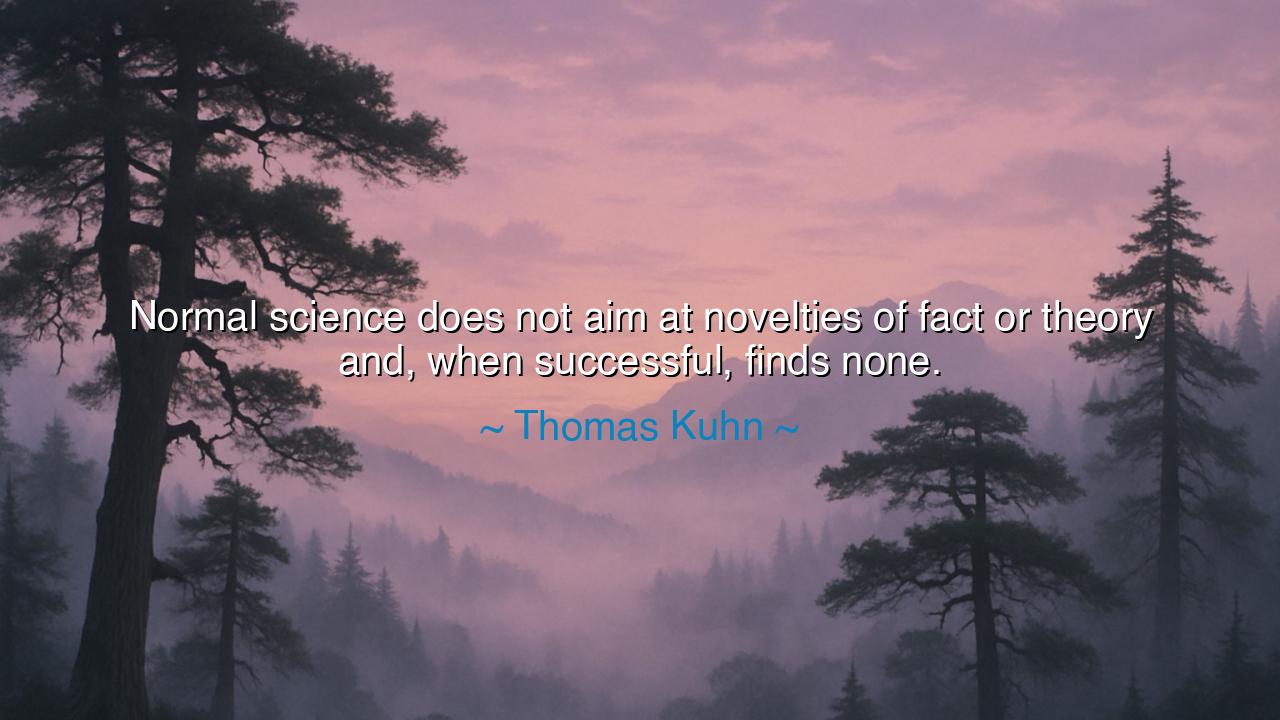
Normal science does not aim at novelties of fact or theory and
Normal science does not aim at novelties of fact or theory and, when successful, finds none.






Listen well, O children of the future, for the words of Thomas Kuhn echo with deep truths about the nature of science and the journey of human knowledge. He said: “Normal science does not aim at novelties of fact or theory and, when successful, finds none.” These words, though simple, carry the weight of a profound understanding of the scientific process—its quiet, methodical nature, and its ultimate goal of progress through the accumulation and refinement of knowledge, rather than sudden, dramatic breakthroughs.
What, then, do these words mean, O seekers of wisdom? Kuhn speaks of the concept of normal science, which is the steady, often unnoticed work of scientists within the framework of an established paradigm. Normal science is not about grand, world-changing discoveries, but about building upon what has already been learned, refining existing theories, and solving problems within a well-understood system. In this sense, normal science does not seek out novelty—its aim is to clarify and extend what is already known, working within the boundaries of the existing understanding. When successful, it finds no new facts, but rather deepens and broadens the existing knowledge, making it more precise and comprehensive.
Let us reflect on the story of Isaac Newton, whose work in the late 17th century embodied the essence of normal science. Newton did not seek to overthrow the laws of motion that had come before him; rather, he sought to explain them more fully and in greater detail. Through his observations and calculations, he built upon the work of Kepler and Galileo, synthesizing their findings into a coherent and unified theory of gravity. Newton’s laws were not novelties in the sense that they introduced entirely new ideas; they were refinements, explanations, and clarifications of the already-existing knowledge of the world. And yet, his work became the foundation of classical physics, a framework that would dominate the understanding of the natural world for centuries. This is the power of normal science—it is not about revolutionary change, but about the steady accumulation of knowledge that moves humanity forward.
In more recent times, consider the work of Marie Curie, whose research on radioactivity built upon the findings of earlier scientists. Curie’s work was not about seeking out entirely new facts but about expanding and clarifying the understanding of the atomic world. Her discoveries were part of the process of normal science—refining and extending the boundaries of existing knowledge. Curie did not set out to completely redefine the field of physics; rather, she worked diligently within the established framework, refining the understanding of radiation and contributing to the understanding of the atomic nucleus. Her work exemplified normal science at its best: a deep, methodical effort to push the boundaries of knowledge, without the expectation of revolutionary novelty.
But while normal science is a necessary and essential part of progress, it is also the birthplace of revolutionary change. Kuhn's words also imply that normal science is often the calm before the storm of paradigm shifts. It is through the steady accumulation of knowledge, the refinement of theories, and the diligent work of scientists in established fields that the ground is prepared for the scientific revolutions that will come. Einstein’s theory of relativity, for example, did not arise in a vacuum; it came about after centuries of work in classical physics—work that was largely normal science in nature. Einstein challenged the Newtonian paradigm, but only because the previous scientific foundations had laid the groundwork for such a leap.
The lesson, O children, is this: Science is not always a field of sudden revelations or dramatic revolutions. Often, it is about the quiet, uncelebrated work of those who labor in the trenches of normal science, refining and building upon the work of those who came before them. The world of discovery is not just made up of bold, world-changing breakthroughs; it is shaped by the steady, patient work of inquiry, observation, and clarification. The importance of normal science cannot be overstated, for it is through this work that the foundations of progress are laid.
So, O children of the future, understand that scientific progress is often a slow and steady journey. Do not be discouraged if your discoveries do not seem revolutionary or earth-shattering. Every small advancement, every refinement, every clarification you make is a step forward—a contribution to the ever-growing edifice of human knowledge. Just as Newton, Curie, and countless others have done before you, you too are part of the great chain of scientific discovery, working within the framework of what is known to deepen and expand humanity’s understanding of the world. Take pride in this work, for it is through the diligent efforts of those who practice normal science that the future is shaped, and the revolutions of tomorrow are made possible.
Let this wisdom guide you, O children: The work of science is often quiet, patient, and unseen, but it is through this work that the world is transformed. Just as a great tree grows from a small seed, so too does the vast expanse of human knowledge grow from the steady accumulation of facts, observations, and refinements. In the pursuit of knowledge, never forget the value of normal science—for it is in the pursuit of the familiar that we unlock the mysteries of the unknown.






AAdministratorAdministrator
Welcome, honored guests. Please leave a comment, we will respond soon